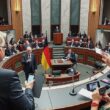The newly elected President of the German Federal Council, Bremen’s Mayor Andreas Bovenschulte, has asserted the crucial role of German federalism in navigating the nation’s complex challenges, framing it not as a source of weakness but as a defining strength. In his inaugural address, Bovenschulte emphasized a concept of “Many Strengths – One Country” a motto intended to underscore the resilience derived from Germany’s diverse federal structure.
Bovenschulte’s pronouncements arrive at a juncture of considerable political tension, with ongoing debates surrounding the degree of centralization within the German system. While acknowledging a potential need for reform, he staunchly defended the principle of cooperative federalism, pointing to its performance during the COVID-19 pandemic and the ongoing response to Russia’s invasion of Ukraine as evidence of its efficacy. Critics, however, maintain that rigid federal structures can impede swift, unified action, particularly in times of crisis.
His priorities, as outlined in the address, include bolstering the German economy, safeguarding fundamental freedoms, reasserting military autonomy and combating social inequality. Bovenschulte argued that federalism is indispensable in reconciling these nationwide objectives with the distinct political perspectives of Germany’s sixteen states (Länder). This balancing act, however, is increasingly difficult given the divergent economic realities and political orientations of the Länder – a situation exacerbated by the increasing fragmentation of German politics.
The unanimous election of Bovenschulte, a member of the Social Democratic Party (SPD), to the Bundesrat presidency signifies a bid to stabilize the often fractious relationship between the federal government and the Länder. The upcoming year promises a period of intense scrutiny regarding how effectively his leadership can bridge policy differences and navigate the critical challenges confronting Germany, particularly as discussions surrounding potential federal reforms – fueled by differing perspectives on issues ranging from energy policy to immigration – are likely to intensify. His term, lasting until October 2026, will be a key test of the enduring relevance of Germany’s federal model in a rapidly changing geopolitical landscape.





